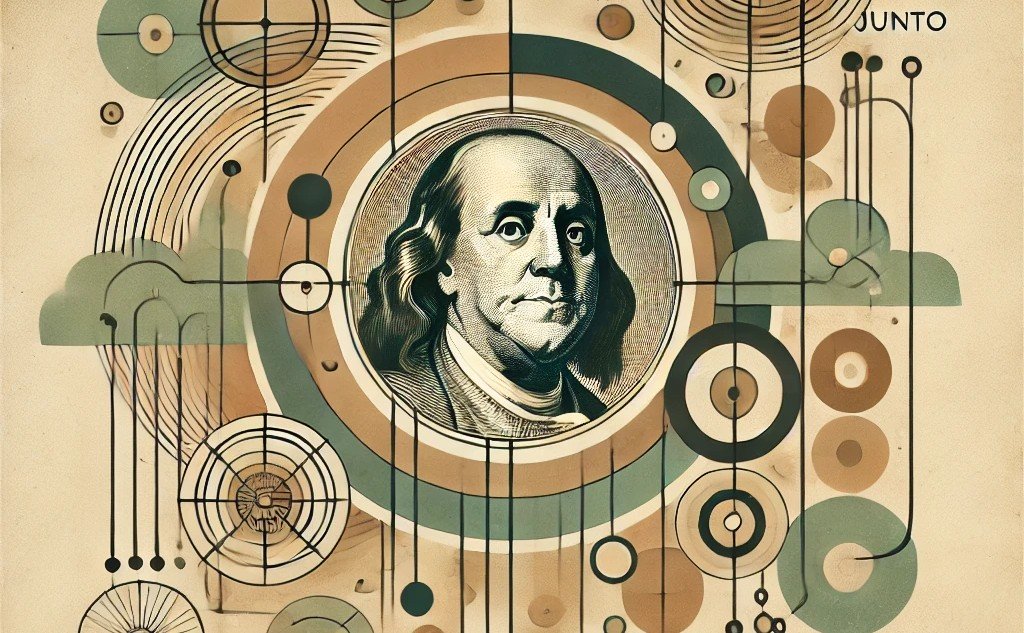Founded by Benjamin Franklin in 1727, the Junto was one of the earliest formalized mastermind groups in history. Also known as “The Leather Apron Club,” this Philadelphia-based group consisted of a diverse set of individuals who met weekly to discuss ideas, debate issues, and support each other’s goals. Franklin’s vision for the Junto laid the groundwork for many of today’s mastermind principles, with a focus on self-improvement, community, and collective wisdom.
The Purpose of Franklin’s Junto
The Junto was more than just a social gathering; it was a structured forum for mutual advancement. Franklin gathered individuals from different trades and backgrounds—merchants, printers, artisans, and professionals—to foster intellectual growth and community service. This diversity enriched discussions and helped members gain insights from perspectives outside their own fields, making it a powerful example of leveraging the mastermind principle to create lasting societal impact.
Junto’s Key Elements and Their Modern Relevance
1. Purpose-Driven Dialogue
- Then: Franklin encouraged Junto members to discuss specific topics that would benefit both their personal lives and the wider community. The group focused on morality, philosophy, science, and business, often contemplating how to improve society.
- Now: Mastermind groups today benefit from having a clear purpose and guidelines for discussion. When members gather with shared goals and focus on topics that foster growth, the group achieves greater outcomes.
2. Structured Questions for Productive Dialogue
- Then: Franklin developed a set of questions for the Junto meetings, touching on topics like self-improvement, moral conduct, and social responsibility. These questions sparked meaningful conversations, encouraged critical thinking, and helped members to learn from each other’s experiences.
- Now: Structured prompts or agendas help modern mastermind groups maintain focus and extract more value from each session. Franklin’s model encourages groups to design questions or themes that align with their goals, making discussions both relevant and enriching.
3. Collaborative Learning and Knowledge Sharing
- Then: The Junto members shared practical knowledge and professional insights, offering support and advice on each other’s challenges. Franklin’s group emphasized a culture of sharing and openness, aiming to advance each member’s skills.
- Now: Modern mastermind groups benefit greatly from a collaborative culture. Members gain access to resources, advice, and new ideas through open sharing, fostering a collective learning environment where everyone grows together.
4. Commitment to Action and Accountability
- Then: Franklin believed in actionable wisdom. The Junto didn’t just talk; they acted. Members made personal commitments, discussed progress, and held each other accountable for implementing their ideas.
- Now: Accountability remains a cornerstone of effective mastermind groups. Setting actionable goals and following up on progress transforms ideas into tangible outcomes. A structured approach to accountability ensures that members remain committed to their development.
Benjamin Franklin’s 24 Junto Questions
One of the most enduring aspects of Franklin’s Junto was his list of 24 guiding questions. These questions encouraged members to think critically, reflect on their values, and engage in honest self-assessment. Here are a few examples that can inspire thoughtful discussion in modern mastermind groups:
- Have you met with any success since our last meeting?
- Do you have anything to ask the advice of the group about?
- Has any member of the group been wronged in any business transaction?
- What new knowledge or information have you gained recently?
- Are there any public matters in which our group could offer a benefit?
These questions serve as timeless prompts, prompting members to engage in self-reflection and group accountability. Adapting Franklin’s questions or creating similar ones can be a powerful tool for today’s groups, helping them unlock deeper insights and build stronger bonds.
Legacy of the Junto in Modern Mastermind Groups
The Junto’s blend of intellectual curiosity, personal growth, and social responsibility offers a model for mastermind groups today. By gathering individuals with diverse perspectives, fostering open dialogue, and holding members accountable, Franklin’s Junto set the stage for the modern concept of masterminds as collaborative environments for achieving personal and communal goals.
For those looking to start or enhance their own mastermind group, Franklin’s Junto offers valuable lessons:
- Emphasize a shared purpose.
- Introduce structured questions to guide discussions.
- Encourage knowledge sharing across different backgrounds.
- Hold members accountable for taking action.
The Power of the Junto Today
Benjamin Franklin’s Junto reminds us that the right environment for shared learning and support can catalyze personal and societal change. By embracing these timeless principles, modern mastermind groups can become powerful tools for both personal achievement and social impact.
